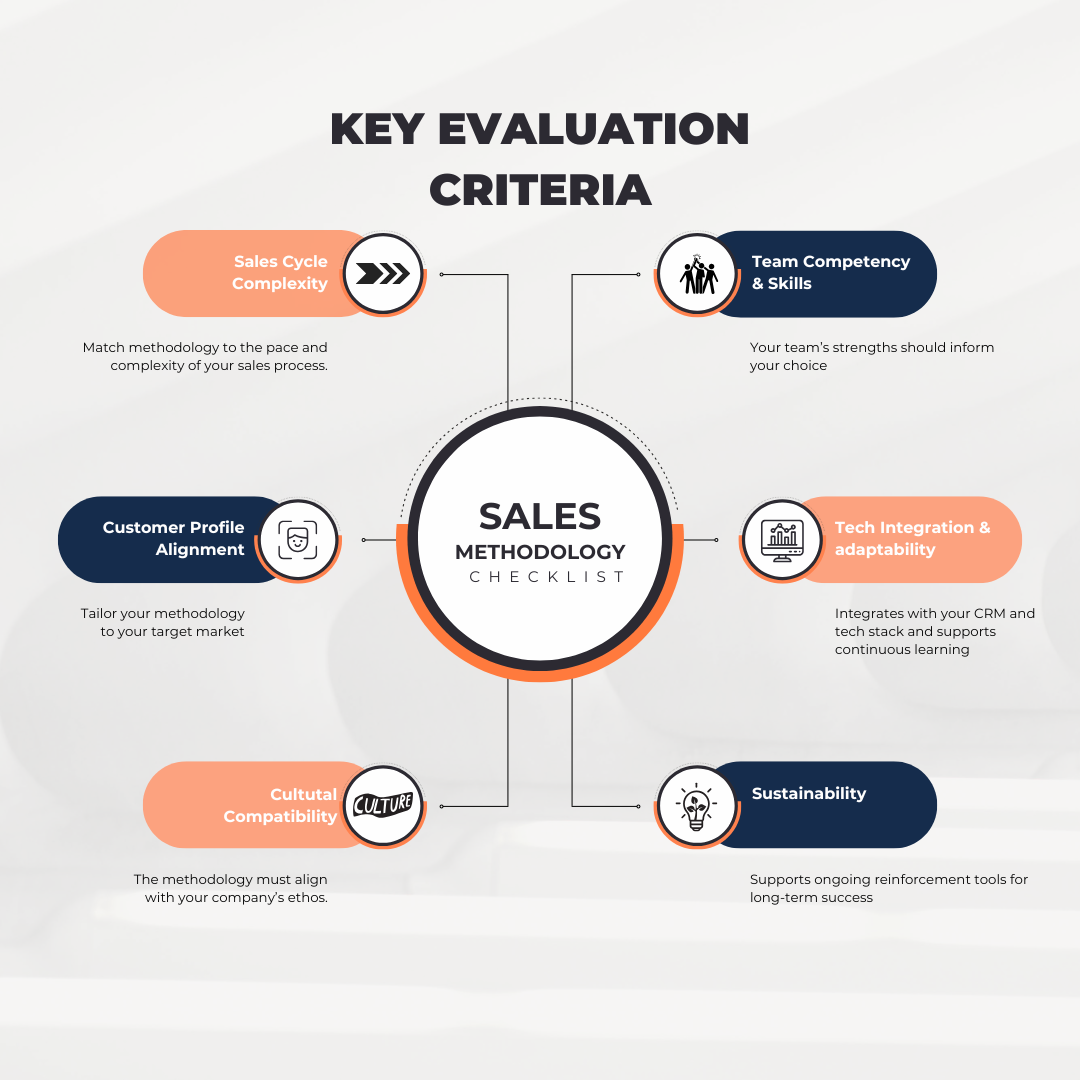Introduction: Choosing the Right Sales Methodology
As SKO season approaches, are you grappling with the challenge of choosing the right sales methodology for your team? The stakes are high: the wrong choice can stifle performance, drain resources, and derail the momentum you need to kick off the year strong. For sales enablement leaders, this decision is not just strategic, it’s personal.
In today’s competitive marketplace, where every buyer interaction matters, the right sales methodology can be the difference between meeting your revenue goals or falling short. From solution selling to consultative approaches, the variety of frameworks and strategies can feel overwhelming. Each methodology promises results, but which one is truly the right fit for your team, culture, and customer base?
In this article, we’ll guide you through a checklist of key considerations to help you navigate the decision-making process with confidence. We’ll also highlight common mistakes to avoid, ensuring your sales team is set up for success and ready to deliver results from day one of your SKO. Let’s dive in and make this your most impactful SKO season yet!
Understanding Sales Methodology
Before we talk details, let’s set the playing field level by getting clear on exactly what a sales methodology is, and is not. A sales methodology is more than a set of tips or scripts; it’s a structured approach that guides sales teams through each phase of the sales process. While frameworks like The Challenger Sale excel at sparking conversations, a methodology provides the skills and discipline to progress opportunities through qualification, value creation, and closing.
Without the right methodology in place, even the best sales teams can lose momentum. As one analysis concluded, methodologies act as the “what’s next?” after the initial conversation.
Why Choosing the Right Sales Methodology Matters
Imagine your sales approach as the engine driving your revenue machine. Each sales methodology represents a carefully designed mechanism, fine-tuned for a specific type of performance. Would a Formula 1 car use a tractor engine? Of course not – and neither should your sales team rely on a misaligned approach that struggles to gain traction. The right sales methodology isn’t just a tool; it’s the GPS guiding your team through complex customer journeys, anticipating buyer needs, and creating repeatable pathways to success.
But why does this choice matter so much?
In an era where 70% of sales teams consistently miss their quotas, having the right methodology is more than a nice-to-have – it’s a survival mechanism. According to Harvard Business Review, organizations with a well-defined and consistently applied sales methodology experience 15-20% higher win rates compared to their unstructured peers. The right approach transforms your team from a group of individuals into a synchronized, high-performing unit operating under a shared strategic blueprint.
Still not convinced? Here’s how the right sales methodology can redefine your sales performance:
Precision in Sales: Beyond the Buzzwords
Recent data from Salesforce reveals that companies with a clearly defined methodology achieve up to 28% higher win rates compared to those without one. Why? Because structure turns unpredictability into science, allowing sales teams to anticipate challenges, adapt to buyer behaviors, and deliver consistent results.
Consistency: The Silent Revenue Multiplier
Standardized methodologies create predictable revenue streams. Research from the Sales Management Association shows that teams with a unified approach experience 15% more consistent revenue, eliminating the chaos of ad hoc selling. Imagine every sales interaction as part of a symphony, with your team playing from the same sheet music, transforming individual efforts into a cohesive performance.
Onboarding: Accelerating from Zero to Hero
Onboarding is one of the biggest challenges for sales teams. With a well-defined methodology, new hires can ramp up 40% faster, according to Salesforce. This isn’t just about training, it’s about equipping new reps with a repeatable framework that empowers them to contribute meaningfully from day one. Tailoring sales approaches to specific buyer personas can further boost conversion rates by up to 35%, turning new recruits into confident, high-performing professionals in record time.
Customer Alignment: The Empathy Advantage
Harvard Business Review highlights a key insight: B2B buyers are 70% more likely to purchase when salespeople understand and address their specific challenges. A strong methodology serves as an empathy engine, transforming transactions into value-driven conversations that build trust and foster long-term relationships.
Data-Driven Evolution: Turning Insights into Strategy
Every sales interaction generates valuable data. With a standardized methodology, those interactions become actionable insights. Gartner research reveals that sales teams using structured approaches can improve forecasting accuracy by up to 25%, converting gut feelings into data-backed strategies that drive continuous improvement.
Choosing the right sales methodology isn’t just a decision – it’s the foundation of your competitive advantage. From boosting win rates to improving team alignment and customer empathy, it’s the key to unlocking your team’s full potential and delivering results that matter.
Who is responsible for selecting a Sales methodology?

Choosing a sales methodology isn’t a one-person decision – it’s a collaborative process that varies depending on the size and structure of the organization. While sales leadership typically holds the final say, sales enablement plays a pivotal role in researching options and guiding the decision. Let’s break it down:
Small Organizations (Startups and SMBs)
- Decision Dynamics: In smaller companies, sales leaders (VP of Sales, Head of Sales) often spearhead the process. These leaders may directly evaluate methodologies, as they’re closer to the day-to-day sales challenges.
- Role of Enablement: Sales enablement might not be a dedicated function in smaller organizations, so other team members (e.g., sales managers or founders) may assist with research and implementation.
- Example: A startup with a lean sales team might prioritize agile, scalable methodologies like SPIN Selling to align with rapid sales cycles.
Mid-Sized Organizations
- Decision Dynamics: In mid-sized businesses, collaboration between sales leadership and sales enablement becomes more defined. Sales enablement typically takes on the bulk of research, evaluating methodologies against business goals, team dynamics, and customer profiles. Leadership weighs in on the final decision.
- Cross-Functional Input: Marketing and operations teams may also contribute, ensuring the chosen methodology aligns with branding and operational processes.
- Example: A mid-sized SaaS company might select The Challenger Sale, leveraging enablement to train the team while sales leaders monitor implementation impact.
Enterprise
- Decision Dynamics: Larger enterprises involve a more structured, cross-departmental process. Sales enablement leads the charge, conducting comprehensive research, piloting methodologies, and making formal recommendations to leadership.
- Leadership Oversight: Sales leadership (e.g., CRO, SVP of Sales) aligns the final decision with broader organizational goals. CFOs or budget owners may also influence decisions due to the financial investment in training and resources.
- Example: An enterprise with a complex sales structure may pilot methodologies like Solution Selling or MEDDIC across regions before scaling the selected approach company-wide.
Collaboration at the core
While the dynamics shift with company size, sales enablement and leadership share core responsibilities:
Role | Key Contributions |
Sales Enablement | Researches methodologies, evaluates vendors, and provides recommendations. |
Sales Leadership | Aligns methodology selection with strategic goals and gives final approval. |
Other Stakeholders | (Marketing, Ops, Finance): Ensure methodology aligns with brand, process, and budget. |
Key Evaluation Criteria for Sales Methodology Selection

👩🏼🦰 Customer Profile Alignment
Tailor your methodology to your target market.
Customer Segment | Recommended Methodology | Why it works |
Enterprise | Solution Selling, Challenger Sale | Navigates long sales cycles with multiple stakeholders. |
Mid-market, SMB | SPIN Selling, MEDDIC | Quick identification of needs and agile value delivery. |
➠ Sales Cycle Complexity & Length
Match methodology to the pace and complexity of your sales process.
- Complex, High-Stakes Sales: Use frameworks like The Challenger Sale or RAIN Selling for tackling long cycles and multi-stakeholder deals.
- Rapid Sales Cycles: Employ quick-value methodologies like SPIN Selling for fast-moving environments.
🧑🤝🧑 Team Competency and Skills
Your team’s strengths should inform your choice:
Team type | Best Fit Methodology |
Relationship-Driven Teams | Solution Selling, Consultative Selling |
Analytically-Oriented Teams |
👨👩👦👦 Cultural Compatibility
The methodology must align with your company’s ethos.
- Customer-centric cultures need adaptable frameworks.
- Avoid aggressive techniques if they clash with your brand values.
⛮ Technology Integration & Adaptability
In the fast-paced SaaS world, the right methodology:.
- Integrates with your CRM and tech stack.
- Supports continuous learning and evolves with market trends.
➕ Additional Considerations
Factor | Key Questions |
Customization Potential | Can the methodology adapt to your market and team’s needs? |
Delivery Capabilities | Are training and reinforcement options flexible and scalable (e.g., virtual)? |
Vendor Experience | Does the provider have a proven track record in similar industries? |
Sustainability | Are there ongoing reinforcement tools for long-term success? |
Final Thoughts
Selecting a sales methodology isn’t about finding a universal solution, but discovering the right fit for your unique organizational ecosystem. The most successful sales teams don’t just adopt a methodology—they integrate it, customize it by focusing on team strengths, customer needs, and company culture, making it an intrinsic part of their organizational DNA. Remember, the ideal methodology isn’t static—it should evolve with your business, enabling your team to stay agile and competitive in today’s market.
Coming up next in our series: How Enablement Can Drive Sales Methodology Success! Discover actionable strategies to ensure seamless selection and execution, along with the pitfalls to avoid. Don’t miss it!
– Authors Bryan Miller and Jaya Bandyopadhyay
Additional Resources
Here is a list of vendors, arranged in alphabetical order, that offer various sales methodologies: